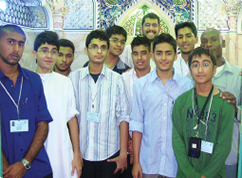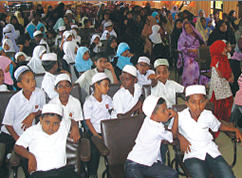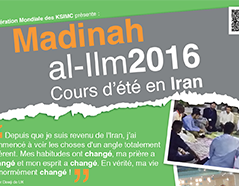As Muslims across the world spend the last days of Ramadhan in prayer, performing good deeds and taking care of their religious accountabilities, paying Zakat al-Fitrah, Fidyah and Kaffarah are among those dues that are foremost in our minds. The World Federation of KSIMC is facilitating payments for Zakat al-Fitrah, Fidyah and Kaffarah.
Please note that the general rules pertaining to Zakat al-Fitrah, Fidyahh and Kaffarah outlined in this article are according to the rulings of Ayatullah Sistani. Please refer to Islamic Laws for more detailed information on these rulings. [1]
|
Zakat al-Fitrah
|
£5 per person
|
|
Fidyah
|
£1.50 per fast
|
|
Kaffarah
|
£90 per fast (feeds 60 poor persons)
|
ZAKAT AL-FITRAH
Zakat al-Fitrah is a religious tax paid at the end of the Holy month of Ramadhan. Few rulings pertaining to this obligation are listed below:
- It is obligatory on every sane adult, who is not poor to pay on his and all his dependents’ behalf about 3 kilos of an item of food that is a staple food in his locality; he can also pay the equivalent in cash.
- It is obligatory for a host to pay Zakat al-Fitrah for his guest who arrives at his house before sunset, if he becomes his temporary dependent.
- Obligatory precuation is that the Fitrah should be distributed to someone who is Shia and poor and based on obligatory precaution, it should not be given to someone who is an open sinner, or who drinks or who does not offer his prayers. However, Fitrah should not be given to someone who uses it in sinful acts.
- One should give Fitrah with the intention of seeking nearness to Allah and fulfilling His orders.
- If a deserving person is available in the hometown of a person, it is an obligatory precaution that the Fitrah money is not transferred to another place.
- Payment of Fitrah becomes wajib (obligatory) after sunset on the eve of Eid ul Fitr. The Fitrah should be paid by the day of Eid ul Fitr before Eid prayers or before midday (the time of Zohr prayers) for those who do not perform Eid prayers.
For further information, refer to this document .
FIDYAH
Those incapables of fasting (such as the elderly, those who cannot fast due to illness, and those who go through desperate situations temporarily preventing them from fasting, such as some pregnant women and some nursing mothers) must offer the Fidyah. The Fidyah is feeding one poor person for each day in which fasting was missed during the month of Ramadhan.
- Fidyah is one Mudd = Approx. 750 grams of food (wheat, barley, bread, or suchlike) to a poor Muslim Shia.
- Fidyah for multiple days can be given to one person.
- Fidyah must be delivered as food and not as money to buy food.
- It is permissible to appoint a wakil (e.g. a trusted charity) who will take money and distribute it.
- This does not need to be given straight away, but neither should it be delayed negligently.
KAFFARAH
Kaffarah is a penalty which becomes payable, as well as the qadha of that fast, for those fasts that were missed intentionally, voluntarily and without any genuine cause (i.e. without a valid excuse) by doing any of the following:
- Eating
- Drinking
- Sexual intercourse
- Masturbation
- Staying in the state of Janabat until the time for Fajr prayers.
According to the ruling of Ayatullah Sistani, invalidating a fast without a valid reason other than those mentioned above should also be re-compensated with Kaffarah and qadha which could be further studied in Islamic Laws. [2]
The Kaffarah for leaving out a fast is to:
- Fast for two months, or feed 60 poor people to their fill (or give one mudd = Approx. 750 grams of food such as wheat, barley, bread, etc. to each of them). In some cases fasting and feeding both become obligation
- If it is not possible to fulfill any of these, then you should give sadaqah according to your means and seek divine forgiveness. The obligatory precaution is that you should give Kaffarah as and when you are able to do so.
Whilst it is not necessary to give Kaffarah immediately, one should not be negligent about it either.
QADHA FASTS
If one has missed any days of fasting during the month of Ramadhan in the previous year, then it is a religious recommendation to make up those fasts before the next Ramadhan.
If one has days of fast to make up, but intentionally does not make them up before the next Ramadhan, the person is still held religiously liable (to make the days up at a later time) and must offer a Fidyah for each day missed by feeding one poor person.
MORE INFORMATION
For specific questions - about your situation, please visit Ask An Alim, where you can submit a question and await a response from an Alim or view similar questions which may apply to you. (LINK TO ASK AN ALIM).
For general information - please view this chart created by The Academy for Learning Islam which shows reasons for not fasting, and the correct corresponding action required.
Click here to pay online .
JAMAAT TREASURER
Make your payment directly to your Jamaat Treasurer
For more information, please email [email protected]
[1] Islamic Laws According to the fatwas of His Eminence al-Sayyid Ali al-Husayni al-Sistani, a new annotated translation by Shaykh Mohammed Ali Ismail, The World Federation of KSIMC, 2015. vol. 1, pp. 382-386, 394-395, 474-481.
[2] Islamic Laws, vol. 1, pp. 368-381.










